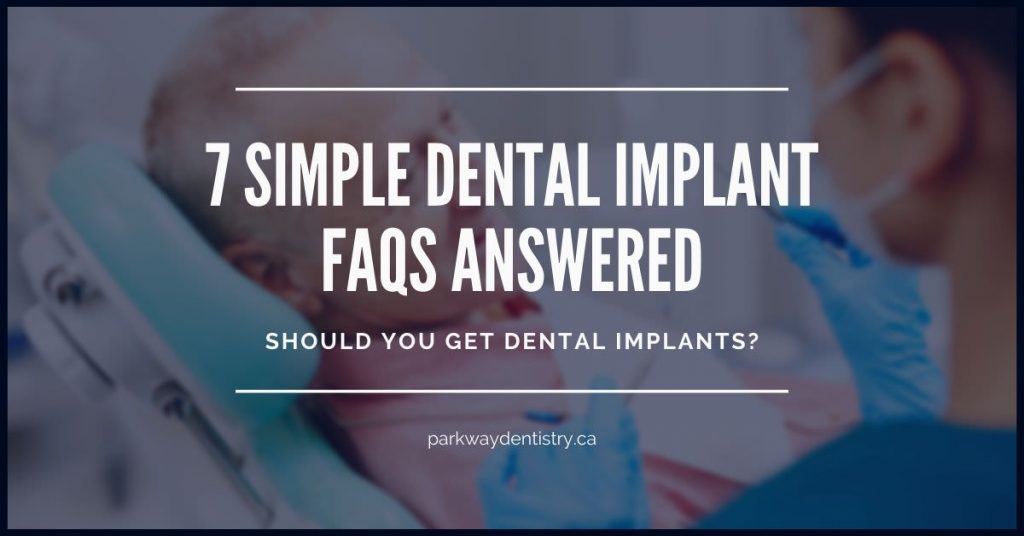7 Simple Dental Implant FAQs Answered

Dental implants are a modern dental procedure that can give people longer-lasting and more natural looking teeth. Here are some answers to some of the most frequently asked questions that people have about dental implants.
Despite advances in dental care, hundreds of thousands of people in Canada suffer from tooth loss. Much of the tooth loss is because of problems like periodontal disease, decay, or even accidents. In the past, the only treatment option available for people with missing teeth were dentures or bridges.
Sections in This Document
- Who can get dental implants?
- What can you eat with dental implants?
- Are dental implants permanent?
- Do dental implants heal gums?
- How long do implants last?
- Can you get teeth whitening with dental implants?
- How long is the dental implant procedure?
Who can get dental implants?
Most people who are healthy enough to undergo oral surgery or dental extractions might be good candidates for dental implants. To be a candidate you must have sufficient bone in your jaw to support the implant and should have healthy gums.
If you get dental implants, you will need to commit yourself to good oral hygiene practices and attend dental appointments regularly.
If you smoke, have heart disease, have diabetes, or have had radiation treatment in the area of your neck or head, you will need to be evaluated on an individual basis to determine whether dental implants are the right choice for you.
What can you eat with dental implants?
Since dental implants are screwed into your jaw bone, they function like natural teeth. You can eat nearly anything with dental implants, including foods that you can’t eat with dentures.
Dental implants will not move around in your mouth while you eat or talk. Immediately after dental implant surgery, you will need to eat soft foods but you can resume a normal diet approximately one week after you get your implants.
Are dental implants permanent?
Dental implants are the most permanent option available to replace missing teeth. Depending on their location in your jaw and how well you care for them, they can last you for the rest of your life.
If your dental implants are located in the back of your mouth, they might not last as long as implants that are placed in the front of your mouth. This is because your molars receive more strain from chewing and are more prone to failure.
Dental implants are screwed into your jawbone. Over the first few months, your implants will become integrated into the surrounding bone. This increases their strength but there are certain factors can cause your implants to fail.
If you have periodontal disease, you can suffer a bone loss that can cause your dental implants to get loose and eventually fall out.
It is important to note that the crown that is attached to your implant is not the implant itself.
While your implants might last throughout your life, you may need to replace the attached crowns approximately every 15 years.
Do dental implants heal gums?
Dental implants do not heal your gums. If you have periodontal disease, you must treat it so that you do not suffer from further bone loss. After you have implant surgery, your gums and bone will take some time to heal.
If you have gum disease you may be prescribed antibiotics and pain medication to prevent infections and pain. Follow all of the recommendations that you are given by your doctor and return if you notice signs of infection, including swelling, a fever or bleeding..
Keeping a healthy mouth after your implant procedure is important for the long-term success of your implants. Make sure to brush your teeth and floss at least two times per day.
Use mouthwash and see your dentist for checkups every six months to keep your gums and mouth in a healthy condition.
How long do implants last?
Your implants will last as long as you properly care for them, and where in your jaw they are attached.
Dental implants have a very high rate of success of as much as 98%. If you care for your them properly, they can potentially last for the rest of your life.
The proper care of dental implants involves the same type of care that you use for your natural teeth. You will need to brush and floss regularly, use mouth wash, and see your dentist for regular dental checkups.
Can you get teeth whitening with dental implants?
Regular teeth whitening treatments should not be used with dental implants. Porcelain crowns and most bonding materials cannot be whitened with traditional whitening treatments. Once your implants have been placed in your jaw, the crowns will not respond to whitening.
Your dentist will match your implants to the colour of your teeth. The porcelain crowns that are attached to dental implants are resistant to stains and stay the same colour regardless of the beverages and foods to which they are exposed.
The fact that porcelain maintains its colour can be both a blessing and a curse. If your natural teeth yellow or darken after you have implants installed, the contrast in colour will make your implants obvious.
This can occur if you allow your teeth to become stained after your implant surgery. It can also happen after you have implants installed that match the colour of your teeth and subsequently have your teeth whitened. This can make your implants appear stained in comparison to your natural teeth.
If you want to whiten your teeth, you should do so before you get your dental implants. Your dentist can then match your implants to the colour of your unstained teeth.
After your implant procedure, make sure to brush your teeth frequently to prevent your natural teeth from becoming stained.
You should brush your teeth after you drink certain beverages like red wine which can stain them. Avoid smoking too.
How long is the dental implant procedure?
The length of your dental implant procedure will depend on
- Your oral health
- The number of teeth that will be replaced
- Whether you will have a dental extraction before the implant procedure
- Which teeth you are replacing
The process can last for several months and can be divided into two phases.
If you need a dental extraction or bone graft before your implant procedure, you will need time to heal between them.
The first phase of your implant procedure is the surgical placement of your implants. This can be done with local anesthesia at your dentist’s office.
Your gums will be anesthetized with local anesthesia. Your dentist will then make an incision in your gums to expose the bone where the implant will be placed.
A drill will be used to create a space for the implant, which will then be screwed into your jaw. Your gums will be closed over the implant. It will integrate into your bone within the few following months.
During the second phase of the implant procedure, your dentist will re-expose your implant. An impression will be made so the lab can make your crown. Your crown will be created based on the models of your other teeth and your mouth. Finally, your new crown will be placed in your mouth.
After your implant surgery, your dentist may give you a temporary prosthetic to use until your final crowns are installed in your mouth. If you are receiving a single-tooth implant, the surgical procedure can be expected to last from one to two hours.
If you will be receiving multiple implants, you should expect the surgical process to last longer.
Dental implants are a great tooth-replacement alternative for people who want a more permanent solution to missing teeth. If you have questions about whether dental implants are a good choice for you, talk to your dentist to learn more.




